The attitude to learning chemistry instrument (ALChI): linking sex, achievement, and attitudes
Abstract
Attitudes towards learning chemistry have been little studied in secondary school students, especially regarding dimensions related to problem solving, the molecular atomic perspective of chemistry, and real-world connection of chemistry. In the present study, we first aimed to design and assess the psychometric properties of the attitude to learning Chemistry instrument (ALChI). A second aim of the study was to assess sex differences and the relation between achievement and attitudes. Participants were 503 secondary school students, from a central southern region of Chile, who answered a 23-item version of the ALChI. The results of the exploratory factor analysis (EFA) revealed that an 18-item scale was most appropriate grouped into four factors: real world connection (RWC), perceived difficulty in problem-solving (PDPS), confidence in problem solving (CPS), and atomic molecular perspective of chemistry (AMPCh). Confirmatory factor analysis (CFA) confirmed the four-factor structure of the model, with optimal fit indexes. Sex factorial invariance was also obtained for configural, metric, and scalar models, demonstrating that ALChI was invariant for sex. Reliability analysis showed moderate to good indices, which suggests good internal consistency of ALChI. On a descriptive level, the highest mean was for the CPS subscale, which entails that students showed a favourable disposition towards their ability to succeed in solving chemistry problems. A structural equation multiple indicators multiple causes (MIMIC) model was conducted to compare factor latent means for sex and assess the relationship between achievement and attitude latent variables. These analyses revealed that achievement was positively associated with all four latent factors. However, no difference by sex was observed across all four factor means. These findings are partially in line with the results from previous studies in more developed countries where attitudes towards chemistry have been consistently linked to academic performance and male students tend to have more positive attitudes than their female counterpart. Our findings are of relevance for researchers, school teachers, and secondary school students since attitudes towards learning chemistry play an important role in choosing a future career path.


 Please wait while we load your content...
Please wait while we load your content...